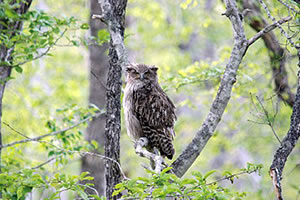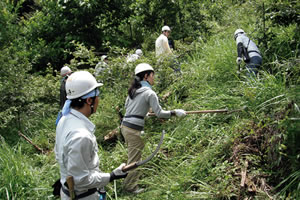Relay Column
Endangered Species Conservation Support by Utilizing ICT

Blakiston's fish owl (Ketupa blakistoni, photo courtesy of Wild Bird Society of Japan)

Fujitsu contributes to society in the field of biodiversity through Information and Communication Technology (ICT). Blakiston's fish owl (Ketupa blakistoni) inhabiting Hokkaido is one of the designated endangered species in the Red List of Ministry of the Environment. Wild Bird Society of Japan (WBSJ) has been conducting habitat survey for the protection of Blakiston's fish owls since 2011. Previously they were checking the presence of Blakiston's fish owls by analyzing the recorded audio spectra with human ears and eyes. However, it took as long as an hour to analyze the 3-hour-long recorded data.
Then, Fujitsu developed and provided a voice recognition program that extracts only songs of Blakiston's fish owls from recorded data with high accuracy by applying its voice recognition technology cultivated in the development of mobile phones. As a result, it became possible to analyze 3-hour-long data in a matter of a few minutes, and thus, to expand the research area, which led to the identification of new habitats. In addition, it also became possible to grasp the scope and frequency of use of habitat in detail, and WBSJ and one paper manufacturing company concluded a memorandum for conservation of Blakiston's fish owls in the survey within the forest owned by that company.
Fujitsu will continue to promote the utilization of ICT for biodiversity conservation.
More Information:
Conserving Japanese Forests

Weeding to help trees grow

JUON NETWORK was established in 1998 supported by the National Federation of University Co-operative Associations to work on conserving and improving the environment, discovering and disseminating local cultures, and solving depopulation/ overpopulation problems by building ties between people in urban areas and depopulating rural villages through the network.
The NETWORK mainly tackles various issues caused by depopulation through activities such as helping farmers with their works and, most notably, the conservation of forests in underpopulated areas. The NETWORK carries out forest volunteer activities at 16 sites nationwide to conserve the forests which have been devastated due to a lack of thinning and other treatments as a result of the decreasing number of forestry operators caused by depopulation and aging of the community.
JUON NETWORK also promotes the production of chopsticks made from the thinned timber from domestic forests. In order for Japanese forests to be properly maintained, it is important to sell timber at an appropriate price. Proper maintenance would be possible if the wood from Japanese forests is used and the profit is ensured. In terms of energy consumption, too, it would be better to use domestic timber rather than imported timber. Currently, Japan's self-sufficiency ratio of wood is approximately 30%. It is important to raise the self-sufficiency ratio of wood as a sustainable resource and use it wisely, and the NETWORK's disposable chopsticks campaign is intended to convey this very message.



